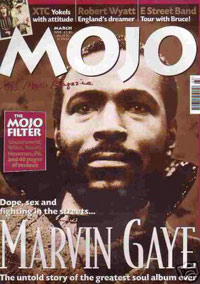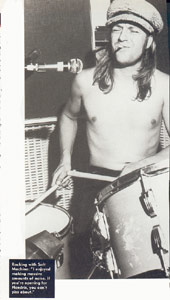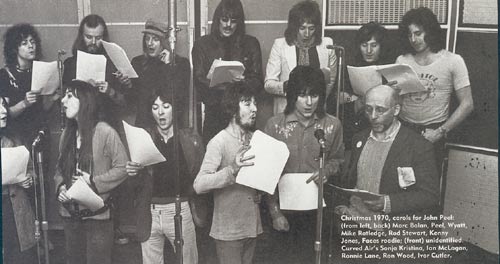| |
|
|
 8
out of 10 cats prefer whiskers - Mojo N°64 - March 1999 8
out of 10 cats prefer whiskers - Mojo N°64 - March 1999
8 OUT OF 10 CATS PREFER WHISKERS
Home
Counties jazz fan, psychedelic Heath Robinson, protest
caroller and musical internationalist, Robert Wyatt is
one of Britain's best-loved institutions. "I'd have
to be some kind of paedophile to be that interested in
youth culture," he tells
Barney
Hoskyns.
'"I'm a bleedin' grown-up."
Portrait by Peter Anderson.
THE DAY BEFORE I DRIVE UP TO Lincolnshire to interview
Robert Wyatt, there is a march through the streets of
Santiago - a procession of relatives of men and women
"disappeared" years ago by the regime of General
Augusto Pinochet, the former dictator of Chile. On this
march, every wife, mother, and brother clutches a placard
bearing a picture of a disappeared beloved and the simple,
stark question, "DONDESTAN?"
I bring a newspaper photograph of the march to show Wyatt,
who in 1991 released a quietly militant masterpiece called
Dondestan - and who, as might be expected, is following
the current Pinochet affair with keen interest.
"There you are!"
he exclaims as he peruses the photograph. "And people
think I make these words up! When I told people Dondestan
meant Spanish for 'Where are they?', they didn't really
believe me."
Although the song Dondestan itself concerns Palestine
rather than Chile, the new five-CD collection EPs By
Robert Wyatt does feature Wyatt's version of a heartbreaking
song by one of Pinochet's most sainted victims. Victor
Jara's Te Recuerdo Amanda, translated in the box set's
booklet, is an exquisitely simple sketch of a woman, radiant
with love, rushing to meet her lover on his five-minute
factory break. Except that her lover turns out to be a
man who "left for the hills / Who never did any harm
/ And in five minutes / Was destroyed...".
"Talk about brave protest singers," Wyatt almost
shudders. "I think that's about as brave as it gets,
really. And there's great pathos in singing about a disappeared
person and then becoming one yourself. So it's pretty
timely."
I ask Wyatt and his wife Alfreda Benge - the "Alfie"
who has long been his caretaker, collaborator, and muse
- if they think Jack Straw will let Pinochet go home.
"I was gonna bet with Alfie that he'd want to stay
on the right side of Spain," Wyatt says. "But
now that the White House has spoken and said send him
back to Chile, I think that's what he'll do. There's no
question in my mind now".
Straw will prove Robert and Alfie wrong, but one can forgive
these former card-carrying Communists for a certain ingrained
cynicism about the cosy relationship between Blighty and
Uncle Sam.
l never do get to ask them about the blitzing of Iraq
that follows two weeks later.
|
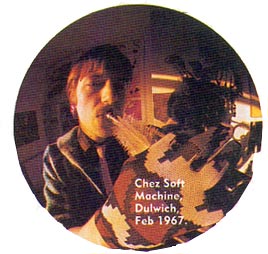
|
The release of EPS by ROBERT WYATT
is the final chapter in the reissuing of almost alI the
recorded work by this English master, a paraplegic with
a Marxian thicket of beard and the sweet, doleful voice
of a chorister. Comprising such Wyatt projects as the 1983
EP Work In Progress and an edited version of his 1981 The
Animals' Film soundtrack, the box ties up alI the loose
ends of the man 's mercurial career, including his 1974
Top 30 hit version of The Monkees' I'm A Believer and the
1983 Top 40 hit version of Elvis Costello's Shipbuilding.
EPs also features remixes of tracks from 1997's acclaimed
'comeback' album Shleep, a serene, playful collection
that chose the personal over the political and returned
Wyatt to the murky dream-states of his post-Soft Machine
classics Rock Bottom (1974) and Ruth Is Stranger
Than Richard (1975). As a fan of the spartan, one-man-and-his-Casio
loveliness of Old Rottenhat (1985) and Dondestan
- and of the wonderful Rough Trade '80s singles collected
on Nothing Can Stop Us (1982) - I was initially thrown
by the spirit of collaboration that brought people like
Paul Weller into the Wyatt frame. But in time I came round
to Shleep as one comes round to everything this sharp,
big-hearted man has done.
When I finally locate the house in the unspoilt Georgian
town where Robert and Alfie live, I find them leafing through
a dictionary of Esperanto in their dining room. Wyatt is
trying to find a title for his next proper album, and Alfie
is suggesting musical terms to look up.
"What's 'strum'?" she asks as she disappears into
the adjoining kitchen.
"It's ludate, which is rather nice. "
"Look up 'sing'," says Alfie, out of view.
"I did. That's kanti."
"'Hum'?"
A pause of several seconds.
"Hum itself is zumi. That's very nice.
That's good, isn't it?
I was going to call the record Humdrum, so if I now
look up drum... Timburo? Tamburo? That's aIl
right, I suppose."
The Wyatts have been in Lincolnshire for 10 years. Prior
to that, they'd been wedged into a flat in Twickenham where
Robert never had any space to work and into which friends
would drop at aIl hours. One day Alfie set forth and drove
as far north as it took to find a house for the price that
the Twickenham flat was worth. "This house simply worked,"
she tells me. "It was somewhere we could go out and
get everything with the wheelchair. It's quite hard to find
a place like that in a place where you're not cut off and
imprisoned. Of course you miss culture. This is a total
culture-free zone. No films, no art. Once a year there's
some jazz in Grimsby. If we hadn 't got a Tardis full of
entertainment that we've gathered along the way - books
and videos and things like that- it would be a desert island,
really. "
Alfie says the worst was when the Gulf War broke out and
she was on her own here. (Wyatt was in the studio working
on Dondestan.) "I was watching it aIl happen
and it was so frustrating not being able to express your
disgust and anger in any way, because the town went on as
it was before and nobody talked about it. In London you
could have gone out and sort of stood somewhere with other
people. On the other hand, we're the right age where we
know what we need and we've had our stimulation and our
adventures. God help any child that's brought up here without
any access to the Science Museum or anything else."
"The ones that worry you," chips in Robert, "are
the ones who are brought up in Lincolnshire as children
and then go on to become Prime Minister. Then you really
see what the pay off of that deprivation is."
Given that the Thatcher years coincided with Wyatt's most
trenchant musical statements about exploitation, imperialism
and the like, this seems a suitable moment to ask him if
he is dismayed by pop's wholesale retreat from political
commitment.
"Ooh, that's difficult," he says, wincing slightly.
"I'm not a sociologist, for a start. And I never felt
that anybody ought to do anything at aIl in that
regard. I was always pleased when people - Jerry Dammers
or Paul Weller - got stuck into an issue, because they didn't
talk obscurely. But l'd have to be some kind of... paedophile to be that interested in youth culture! l'm a bleedin' grown-up.
I listen to grown-up music."
|
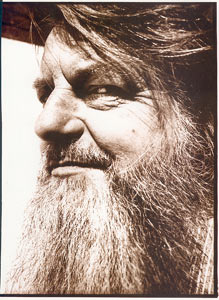
|
|
|
MOJO : You've talked about how hard
it is to fight against the "ideological soup"
that is the centrist politics of Blair and Clinton. Was
it easier to shout out against Margaret of Grantham?
Thatcher was exorcism for me. The other night we were
watching Harold Pinter on telly being asked about this
transition he made to where he was overtly and directly
engaged politically, where there were goodies and baddies.
He said he was traumatised in the early '80s. He was stifled
by the climate. . . suffocated was maybe the word
he used. You fight your way out of it like you do out
of suffocation. When propaganda is disseminated in such
vastly effective ways there is a feeling of, well, somebody's
got to say the other side of all this. You get baited.
The purpose of conservative establishment propaganda is
simply to demoralise the opposition, to gas you into submission.
You fight because you fight for your own mental survival.
That's all it is.
There's a fair amount of political/protest music on
the EPs box, from Peter Gabriel's Biko to The Animals'
Film.
I would like some of my stuff to be more anachronistic
than it is, but sadIy it's not an anachronism to be singing
a song like Te Recuerdo Amanda, written by someone who
was tortured to death by Pinochet's people. And the version
of The Animals' Film is also timely. There's a
central contradiction in the vivisectionists' argument:
they say it helps to experiment on animals because they're
so like us, but at the same time they're saying animals
are so unlike us that they don't suffer like we do. Well,
you can't really have it both ways. There is actually
an organisation called DAARE, Disabled Against Animal
Research - it adds moral clout if disabled people themselves
say that the whole purpose of doing good is to reduce
the amount of suffering in the world.
Have the Rykodisc/Hannibal reissues - including Dondestan
(Revisited), which afforded you the chance to improve
on an album that you thought had been rather hurriedly
mixed - brought a cheer to your heart?
Yeah, it's made me feel like I've been doing something!
I'm really grateful to Ryko. They're a terrific bunch
of people - really friendly and helpful and conscientious.
The way Joe Boyd has done his repackaging of people like
Sandy Denny, who are completely outside the fast traffic
of the commercial record world, keeps these safe little
pockets accessible to anybody who wants to make that effort.
It's also been a chance to refresh things, like Alfie
redoing or adding to the artwork, and also getting some
of the words printed that weren't there before. And really
having another crack at Dondestan, putting it in
more of a context with Alfie's photographs. It's a great
feeling.
But I have been doing other things as well. New recordings
that I've really enjoyed. One was the Federico Garcia
Lorca centenary this year, and this bunch of Spanish people
put together a compilation [De Granada A La Luna]
setting Lorca to music. They sent me a bit of text and
I did it just with a bass player called Chucho Merchan,
who's based in England and played on a couple of tracks
on Shleep - a lovely geezer and a shit-hot musician. They
invited us to Granada for the presentation, even though
I don't do any live gigs, so I was just there in my capacity
as... mascot teddy bear. The other thing was an Italian
group called CSI, who got a bunch of groups to do a CD
of tunes that I've sung [The Different You: Robert
Wyatt E Noi]. Half of them were my songs and the rest
were things I've sung, like Yolanda. So I sang a track
on that, one of their tunes called Del Mundo - the first
time I've ever tried to sing in Italian. It was incredible
to be asked. And the general principle of other people
doing my tunes while I sit at home drinking tea is, I
think, to be encouraged.
Going back to the start of your story, would it be
fair to say that you were blessed with unusually hip parents?
My parents were great. I've only just been orphaned, in
fact: my mother died about a month ago. I've actually
very rarely been directly questioned about what went on
in Kent. I don't remember it being as breezy and glamorous
and easy-going as people describe it. My dad contracted
multiple sclerosis when I was about 10, and my parents
moved out to near Dover. So the backdrop was my dad retiring
early and fading away fairly fast, and my mother struggling
as a freelance journalist to make ends meet. They put
their last money into a falling down old house, and we
were there six or seven years. I went to school a one-hour
bus drive away to Canterbury, and I have to say I was
very unhappy there. And although it's true that I became
interested in music and started playing with other people
who were interested in music, this idea of some swinging
scene is simply not how I remember it. It was grimmer,
and I found Canterbury a rather pofaced sort of town -
I remember going into Canterbury Cathedral and signing
"Jesus Christ" in the visitors' book, and a
school prefect came up behind me and I was caned. I couldn't
keep up with school work at all, so I left when I was
about 16 and spent six years or so floating about.
Floating about where?
It was a rather lonely time. In late teens people might
be going to college or university, whereas I was having
to earn a living. My parents went off to live in Italy,
and then I worked in a forest, and then as a Iife model
at Canterbury Art College.
Then I worked in London, a large kitchen, funnily enough
at the LSE, though I'd only ever see the students through
the hatch. There was a staff of about 80 people there, and
I was about the only bloke and about the only non-Caribbean.
They were such a laugh, and they made me so welcome. I didn't
really know London very well, and they used to take me back
to their places and to their parties. They mothered me around
and sat me in dark rooms with cans of beer, blasting me
with what was I suppose proto-bluebeat music.
Do you generally retain good memories of making music
in the '60s?
I've been quite shocked to see bits of old film where
l'm drumming, and I obviously used to get stuck in on
the old drum kit. But it all collapsed in such an unhappy
way that, to be honest, I don't dwell on it, no. Of course
I worked with some great musicians, but in the end I never
really found a home as a drummer. So that my period of
stimulus and excitement sort of goes from having a really
good time until I was about 10 or 11, until school started
to get hard. Then it's sort of blank, really, 'til about
1971 or 2. What I do remember enjoying was just that little
bit later on: working with people like Henry Cow, that
kind of thing.
I know that your ejection from Soft Machine is something
that's still painful to you. I wondered if the Shleep song
Was A Friend, which Hugh Hopper co-wrote, had any bearing
on that?
So did I!
Alfie: At the end of that song, when Robert sings
"We are forgiven", I wanted to join in and say:
"No! Never!"
RW: Alfie's a tough cookie. The thing is, I don't
really like reading stuff where musicians talk about this
stuff. It all gets so Spinal Tap when you start talking
about "musical differences". How can anybody expect
any number of lads to be able to do their own thing and
stay together that long ? I could have done with some of
the money when we came out of it, but we managed. So we
must all be like Nelson Mandela about these things.
Could Soft Machine have ever been as big as their great
rivals at the time, Pink Floyd?
No, it was too different. Pink Floyd had hit singles from
the start, and terrific ones too. And they had a whole grandeur
and presence that wasn't anything to do with us. The only
thing we had in common was that some of the audiences were
the same in the sense that they were prepared to listen
to tunes they hadn't heard before. I don't think Soft Machine
had enough vision or coherence to get a loyal public. We
didn't really know what we were doing. I was too much of
a jazz fan. I like to travel light, with a little drum kit.
I honestly don't need a lot of the other stuff. I do like
eating fried-egg sandwiches.
Do you still feel a connection to the avant-garde spirit
of that period?
It's an odd thing, that. In fact, there were a lot more
things like what we now call World Music before the beat
group hegemony took over the record shelves, actually. People
did go and see Ravi Shankar, and they did listen to calypso
and bossa nova and all kinds of things. There was a reach
to outside the local culture, a very wide one. Really this
aIl happened in the '50s, and a lot of the stuff was cannibalised
years later in the rock field - by people like us. I wasn't
culturally a rebel at all in terms of my parents. In fact,
I really liked my dad's records and paintings and stuff
that he liked, which was the avant-garde of the first half
of the century. Picasso, Prokofiev. So that was a starting
point, but it was already a nostalgia for an imagined world
that my dad lived in. And even when I got into bebop and
modern jazz in the '50s, it was already nostalgia for an
imaginary Harlem or something. When some people say art's
got to be new, it's got to be cutting-edge, it doesn't mean
anything to me at all. I have no ideology of newness.
|
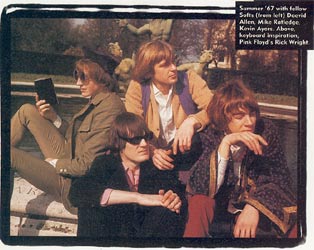
|
When you played with Jimi Hendrix, did you think, this
guy is light years beyond what most of us are doing?
It was a shock, yeah. It was a lurch. Just how far he'd
got, having not seen the roots of it. Always underestimated,
I think, was his group, and Mitch Mitchell particularly.
There's very few drummers who could have ridden the storm
and clocked where the beat was, what the time was, and dealt
with that funky beat but at the same time flying like the
wind and following Hendrix all over the place. Then again,
Hendrix has to be given credit for such a loose group, far
looser than anyone else at the time. As someone who'd spent
much longer listening to the glorious disintegration of
bebop into Sun Ra and Charlie Haden and Don Cherry, this
felt more comfortable to me than the strict time and neat
and tidy blocks of sound that rock music was locked into.
The music breathed, it had air in it. Of course, bits floated
off and got lost, but that suited me fine. They were a great
encouragement to us, particularly Mitch, who at the end
of the tour gave me his kit. Which I've still got [upstairs].
I've never used another. Everything you hear of me on a
drum kit is on that maple-wood kit.
Also, Hendrix was not a prima donna. He was actually quite
a modest gent, a bit of a grown-up. He' d done those things
that conservatives say young men should do. He'd done his
stint in the forces. So between the forces and Little Richard's
band, he knew all about discipline! He was very, very secure
in that way. But he took risks aIl the time. A great inspiration.
I can't imagine that period without him. He was pure light.
I did see him every night playing something like Red House,
and every night it just made the hairs stand up on the back
of your neck. I feel quite tearful about it, even now.
Do you think if you hadn't had the accident in 1973 that
you would have found the musical voice that you have, and
made the music you've made?
No. One thing I'm really grateful for is not being a drummer
anymore, as a primary thing. That forces me to take charge
of my own music. I should have done it before. It was a
good career move... as everyone said when Elvis Presley
died. I just carried on with what I do, which is basically
slightly out-of-tune nursery rhymes. Up to that point, as
a drummer and arranger, I'd been trying to sort of take
on everything there was to take on, in terms of music-making
- all the harmonic and rhythmic ideas that were available.
Which is a great apprenticeship in music, but then you end
up saying: What actually is your voice? What is it you yourself
have to offer? And the accident made me have to work that
out.
I was thinking about how hymnal many of your songs sound.
The keyboards sometimes suggest an organ in a little country
church, and the voice is like some doleful choirboy. Any
idea where that comes from?
The first things I remember my dad playing, before MS stopped
him, involved us standing round the piano and singing things
like Away In A Manger. I've always liked that rather static
feel. In fact, you get it in surprising places. Some South
African music has it - you can hear the hymns in the background
somewhere or other. Also, some of the most influential music
l've listened to was the Charlie Haden stuff, as arranged
by Carla Bley. Liberation Music Orchestra is stateIy
but ramshackle at the same time. I loved the feel of it.
The whole thing came up again in one of John Peel's daft
projects, getting everybody to sing Christmas carols in
the studio. I did Good King Wenceslas with Ronnie Lane -
he was Wenceslas and I was the page, singing in this sort
of falsetto. It came straight out, I had no problems with
it.
|
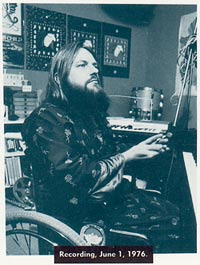
|
Is it accurate to say your voice
is a countertenor?
I don't know quite what it is. I've lost some top notes
recently, a semitone every year, just about. I can get comfortably
up to about a G above middle C. I've got a falsetto in my
voice that a lot of people use and comes from black music.
I used to listen to a lot of women singers like Dionne Warwick.
I could sing along to Dionne Warwick easier than I could
to Ray Charles.
I've always been curious to know how the sound of Rock
Bottom - that dreamy, murky minimalism - was born in your
head.
Where did the keyboard sound originate?
The keyboard itself suggested it. Alfie got this thing called
a Riviera in Venice, and what I liked about it was that
you were able to slow the vibrato right down - normally
with things like the Hammond organ the vibrato is quite
fast and it's set. So with this Riviera I was able to tune
in with the kind of vibrato I wanted, and I was able to
play rather like I would sing if I could be a little choir.
I could set my voice right into it, and it was like stepping
into a warm bath of sound. I felt really at home. But where
it comes from, I don't know. I was impressed by the way
Rick Wright used to play in the Floyd - it was nothing like
the only way I knew how to play at that time, which was
somewhere between Booker T. and Jimmy Smith. He left all
the drama and dynamics to the other instruments and just
created these glacial harmonic backdrops - a very good bit
of stage-setting, and rather underestimated. So I was affected
by him, although there's a grandeur to what they do, which
is not a word that comes to mind with my tunes!
You sit at this intersection of so many different strands.
There aren't many people who connect Eno to The Monkees,
or Paul Weller to Mike Oldfield. Why is that?
I don't sit down and try and be eclectic. I really like
Paul, and I really like Evan Parker. And me in the middle
is just the same old thing. No, it's just that I really
like all these people and the way they play. Sometimes it's
not to do with their genre, but with the character of the
particular musician. It's the thing I really like about
music and working with other musicians. As a jazz fan, when
you had an Art Blakey, there they were - Horace Silver,
Benny Golson - and you felt these people in the room, you
got a sense of the actual characters. The sense of contrast
between Coltrane, Cannonball Adderley, and Miles Davis I
really felt them as people. There's a particular character
trait of someone like Paul that I really find appealing,
and it gives you an extra musical thing. It's the actual
company, the imagined character that comes through the music.
Did you always intend Shleep to be a more collaborative
venture than its predecessors?
Shleep was recorded like Rock Bottom, which is to
say that I was prepared to record the whole thing myself
like Dondestan. So that any musicians coming was
a lovely luxury - a bit of virtuosity, whether it was Annie
Whitehead's trombone or Paul's guitar or Evan's saxophone.
But I'd mapped it all out myself, and wasn't relying on
anybody else to make it work. Their role was to enhance
it. Most of the guests on there would come for a weekend
or something, and they'd work on a couple of songs. They
really brought out stuff that hadn't occurred to me, or
at least had in my head, but I couldn't write the sort of
early Mingusy thing with trombones and saxophones weaving
about, but Annie and Evan concocted much nearer what I had
dreamed of. And I wanted Blues In Bob Minor to be a proper
sort of blues, even though with my rickety rhythm section
thing it's not as beefy as a blues would be done normally.
With a bit of encouragement - he didn't wanna disturb the
mood of the song - Paul took it much further than I had
planned to.
Alfie: Robert's one weakness is that he's not assertive,
so he can easily let things go in order not to hurt somebody's
feelings, or because he doesn't want to be seen as a prima
donna. He knows what it is in his head, but he lets things
go because he doesn't want to mess up the atmosphere.
You've talked often of "rock" as opposed to
"roll". Do you think "rock" as a phenomenon
has burned itself out and become a bit of a joke?
I'd have been quite happy coming out of the '50s into the
'60s if there'd never been any rock at all. l'd have been
quite happy listening to jazz and bossa nova and rhythm
and blues and Cuban music and African stuff. My favourite
guitarist's still Wes Montgomery. I can't think of anything
that was going on that wasn't quite enough for me already.
On the other hand, you'd never have had Hendrix.
That's right. When I actually think of it, there's lots
of lovely rock bands and rock musicians. What happened in
rock music was that the guitar took over the role that brass
sections in rhythm and blues had had. If you listen to The
Contours' original Do You Love Me, it strikes me as being
a stronger, more powerful record than any beat group cover
version: it's got a drama and a clarity and it swings like
fuck. Who could ask for anything more?
Is it an argument, at the end of the day, about power
versus sensuality?
I've got ears, and I can hear how dramatic and exciting
electric guitars can be, but I can live without it. Maybe
l'm not as eclectic as I've been suggesting. A difficulty
I had with rock was that I wasn't altogether happy with
what happened to drumming. I'd been following the history
of drumming in jazz, where rhythm was broken up by drummers
like Kenny CIarke and Philly Joe Jones into this wonderful
breathing thing, and rock'n'roll seemed to me to take it
back to that march-bond thump-on-every-beat, and it just
gave me claustrophobia. It's also a musical thing - a lot
of rock'n'roll is in eighth-note and 16th-note intervals,
whereas what I really love about jazz, and why it's my music
of the century, is the triplet feel of the 12/8 signature,
the implied three and four simultaneously, which you'll
hear in even the most simply equipped West African groups.
That seems to me the organic live element that made jazz
solos possible and gave a kind of flow to the music, and
I'm sticking with that flow... But you could probably stick
a bit of John Bonham on and I'd be going, Yeah!!
|
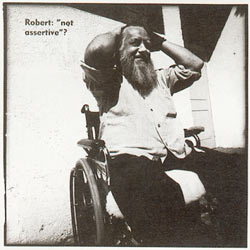
|
Do you try to keep abreast of pop music?
I don't feel I'm missing anything, but I can't say that
I need much, either. l'm very intrigued by people like Tricky,
and what's going on around his vocals. And a lot of what
happened with dub, those lo-tech ideas of what you can do
in the studio, and then that being picked up by New Yorkers
and them doing pan-tonal stuff with hip hop. Perhaps the
most recent influence I've had was Björk's last record.
I took a bit of courage from her about how to place things.
You have to have no fear of technology. There was a nice
thing she said in an interview: "I'm not scared of
technology, my dad was an electrician!"
Alfie: We really love this record by Wyclef Jean
we've been hearing. Something about November.
Gone 'Til November?
RW: Oh, yes, that's great. As a bit of pop song stuff,
that's the best I've heard since Björk.
You are - are you not? - a godfather of lo-fi. The very
primitive drum machines on East Timor [Old Rottenhat],
for instance.
Absolutely right. And it goes back to when I used to like
Paul Klee's drawings: those spidery pen-and-ink drawings
with splodgy bits on and rather feeble colouring-in. I really
like precarious, rickety things and always have done. I
spent quite a few years in very loud bands, making massive
amounts of noise, and I enjoyed all that. If you're opening
a concert for Hendrix in front of 15,000 Hendrix fans, you
can't piss about. You can't be whimsical, you've got to
come up with something. So I do know about all that.
What was the last occasion on which you performed on
a stage?
It was in a little club, doing Born Again Cretin with The
Raincoats. That would have been about 1983. They did it
very nicely, as it happens.
Could you ever see yourself giving a live performance
again?
I couldn't, no. I dream about it sometimes, and they're
alwoys nightmares: I can't remember the words, the band
doesn't know what key the songs are in, and I've forgotten
what order we're doing them in.
| |
THE CONVERSATION WINDS down
with tea and doughnuts. Outside, a damp, grey sky
unfolds across Lincolnshire. When Robert briefly leaves
the room, Alfie tells me conspiratorially about a
new keyboard a Yamaha "dance keyboard",
she calls it- that he acquired after Shleep.
"I'm always trying to get him to buy something
new," she says. "And he does buy something;
but then of course he can't make any of it work. He's
just not made for machines. He doesn't even know how
to turn them on. He still has the Riviera, but some
of the notes started to break up. The next thing he
was really fond of was this Wasp, a little small computer
thing that made a very good bass sound - he did a
lot of Old Rottenhat with that. There are alI
these sort of dead things upstairs. Like this old
trumpet I got him in a car boot sale."
When Wyatt re-enters the room he plays me the nine-minute
Cancion De Julieta that he contributed to the Lorca
album. It's a huge, mournful thing, with groaning
keyboards and horn sounds like baleful whale noises,
reminiscent of something off Charlie Haden's Liberation
Music Orchestra...
Un mer de sueno
Un mer de tierra blanca...
(Oceans of dreaminess
A sea of white earth...)
"This one was obviously meant for me," Wyatt
says as we listen. "Sometimes I react against
that kind of typecasting, but in this case they were
absolutely right. It's serendipity I think... though
I never quite know what that means. "
Alfie smiles across the table at him.
"I think it's the future, myself," she says.
|
|
|

